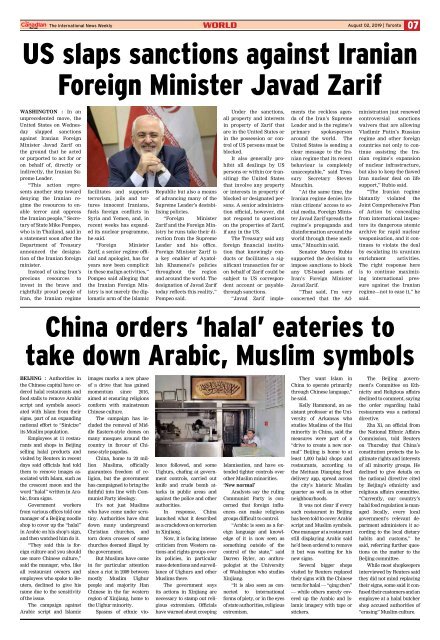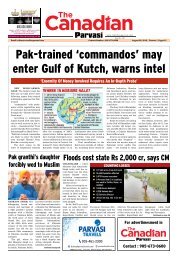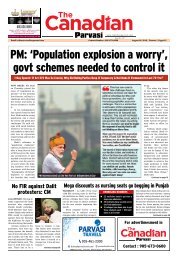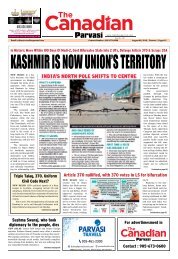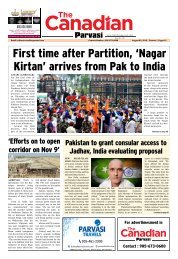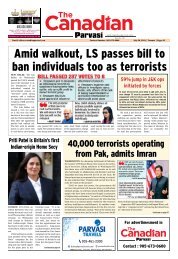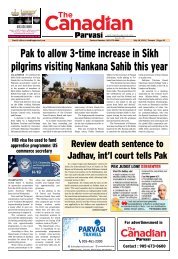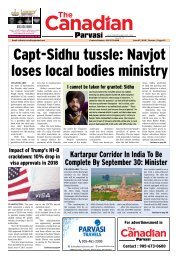You also want an ePaper? Increase the reach of your titles
YUMPU automatically turns print PDFs into web optimized ePapers that Google loves.
<strong>The</strong> International News Weekly world<br />
August 02, 2019 | Toronto<br />
07<br />
US slaps sanctions against Iranian<br />
Foreign Minister Javad Zarif<br />
WASHINGTON : In an<br />
unprecedented move, the<br />
United States on Wednesday<br />
slapped sanctions<br />
against Iranian Foreign<br />
Minister Javad Zarif on<br />
the ground that he acted<br />
or purported to act for or<br />
on behalf of, directly or<br />
indirectly, the Iranian Supreme<br />
Leader.<br />
“This action represents<br />
another step toward<br />
denying the Iranian regime<br />
the resources to enable<br />
terror and oppress<br />
the Iranian people,” Secretary<br />
of State Mike Pompeo,<br />
who is in Thailand, said in<br />
a statement soon after the<br />
Department of Treasury<br />
announced the designation<br />
of the Iranian foreign<br />
minister.<br />
Instead of using Iran’s<br />
precious resources to<br />
invest in the brave and<br />
rightfully proud people of<br />
Iran, the Iranian regime<br />
facilitates and supports<br />
terrorism, jails and tortures<br />
innocent Iranians,<br />
fuels foreign conflicts in<br />
Syria and Yemen, and, in<br />
recent weeks has expanded<br />
its nuclear programme,<br />
he said.<br />
“Foreign Minister<br />
Zarif, a senior regime official<br />
and apologist, has for<br />
years now been complicit<br />
in these malign activities,”<br />
Pompeo said alleging that<br />
the Iranian Foreign Ministry<br />
is not merely the diplomatic<br />
arm of the Islamic<br />
Republic but also a means<br />
of advancing many of the<br />
Supreme Leader’s destabilising<br />
policies.<br />
“Foreign Minister<br />
Zarif and the Foreign Ministry<br />
he runs take their direction<br />
from the Supreme<br />
Leader and his office.<br />
Foreign Minister Zarif is<br />
a key enabler of Ayatollah<br />
Khamenei’s policies<br />
throughout the region<br />
and around the world. <strong>The</strong><br />
designation of Javad Zarif<br />
today reflects this reality,”<br />
Pompeo said.<br />
Under the sanctions,<br />
all property and interests<br />
in property of Zarif that<br />
are in the United States or<br />
in the possession or control<br />
of US persons must be<br />
blocked.<br />
It also generally prohibit<br />
all dealings by US<br />
persons or within (or transiting)<br />
the United States<br />
that involve any property<br />
or interests in property of<br />
blocked or designated persons.<br />
A senior administration<br />
official, however, did<br />
not respond to questions<br />
on the properties of Zarif,<br />
if any in the US.<br />
<strong>The</strong> Treasury said any<br />
foreign financial institution<br />
that knowingly conducts<br />
or facilitates a significant<br />
transaction for or<br />
on behalf of Zarif could be<br />
subject to US correspondent<br />
account or payablethrough<br />
sanctions.<br />
“Javad Zarif implements<br />
the reckless agenda<br />
of the Iran’s Supreme<br />
Leader and is the regime’s<br />
primary spokesperson<br />
around the world. <strong>The</strong><br />
United States is sending a<br />
clear message to the Iranian<br />
regime that its recent<br />
behaviour is completely<br />
unacceptable,” said Treasury<br />
Secretary Steven<br />
Mnuchin.<br />
“At the same time, the<br />
Iranian regime denies Iranian<br />
citizens’ access to social<br />
media, Foreign Minister<br />
Javad Zarif spreads the<br />
regime’s propaganda and<br />
disinformation around the<br />
world through these mediums,”<br />
Mnuchin said.<br />
Senator Marco Rubio<br />
supported the decision to<br />
impose sanctions to block<br />
any US-based assets of<br />
Iran’s Foreign Minister<br />
Javad Zarif.<br />
“That said, I’m very<br />
concerned that the Administration<br />
just renewed<br />
controversial sanctions<br />
waivers that are allowing<br />
Vladimir Putin’s Russian<br />
regime and other foreign<br />
countries not only to continue<br />
assisting the Iranian<br />
regime’s expansion<br />
of nuclear infrastructure,<br />
but also to keep the flawed<br />
Iran nuclear deal on life<br />
support,” Rubio said.<br />
“<strong>The</strong> Iranian regime<br />
blatantly violated the<br />
Joint Comprehensive Plan<br />
of Action by concealing<br />
from international inspectors<br />
its dangerous atomic<br />
archive for rapid nuclear<br />
weaponisation, and it continues<br />
to violate the deal<br />
by escalating its uranium<br />
enrichment activities.<br />
<strong>The</strong> right response here<br />
is to continue maximizing<br />
international pressure<br />
against the Iranian<br />
regime—not to ease it,” he<br />
said.<br />
China orders ‘halal’ eateries to<br />
take down Arabic, Muslim symbols<br />
Beijing : Authorities in<br />
the Chinese capital have ordered<br />
halal restaurants and<br />
food stalls to remove Arabic<br />
script and symbols associated<br />
with Islam from their<br />
signs, part of an expanding<br />
national effort to “Sinicize”<br />
its Muslim population.<br />
Employees at 11 restaurants<br />
and shops in Beijing<br />
selling halal products and<br />
visited by Reuters in recent<br />
days said officials had told<br />
them to remove images associated<br />
with Islam, such as<br />
the crescent moon and the<br />
word “halal” written in Arabic,<br />
from signs.<br />
Government workers<br />
from various offices told one<br />
manager of a Beijing noodle<br />
shop to cover up the “halal”<br />
in Arabic on his shop’s sign,<br />
and then watched him do it.<br />
“<strong>The</strong>y said this is foreign<br />
culture and you should<br />
use more Chinese culture,”<br />
said the manager, who, like<br />
all restaurant owners and<br />
employees who spoke to Reuters,<br />
declined to give his<br />
name due to the sensitivity<br />
of the issue.<br />
<strong>The</strong> campaign against<br />
Arabic script and Islamic<br />
images marks a new phase<br />
of a drive that has gained<br />
momentum since 2016,<br />
aimed at ensuring religions<br />
conform with mainstream<br />
Chinese culture.<br />
<strong>The</strong> campaign has included<br />
the removal of Middle<br />
Eastern-style domes on<br />
many mosques around the<br />
country in favour of Chinese-style<br />
pagodas.<br />
China, home to 20 million<br />
Muslims, officially<br />
guarantees freedom of religion,<br />
but the government<br />
has campaigned to bring the<br />
faithful into line with Communist<br />
Party ideology.<br />
It’s not just Muslims<br />
who have come under scrutiny.<br />
Authorities have shut<br />
down many underground<br />
Christian churches, and<br />
torn down crosses of some<br />
churches deemed illegal by<br />
the government.<br />
But Muslims have come<br />
in for particular attention<br />
since a riot in 2009 between<br />
mostly Muslim Uighur<br />
people and majority Han<br />
Chinese in the far western<br />
region of Xinjiang, home to<br />
the Uighur minority.<br />
Spasms of ethnic violence<br />
followed, and some<br />
Uighurs, chafing at government<br />
controls, carried out<br />
knife and crude bomb attacks<br />
in public areas and<br />
against the police and other<br />
authorities.<br />
In response, China<br />
launched what it described<br />
as a crackdown on terrorism<br />
in Xinjiang.<br />
Now, it is facing intense<br />
criticism from Western nations<br />
and rights groups over<br />
its policies, in particular<br />
mass detentions and surveillance<br />
of Uighurs and other<br />
Muslims there.<br />
<strong>The</strong> government says<br />
its actions in Xinjiang are<br />
necessary to stamp out religious<br />
extremism. Officials<br />
have warned about creeping<br />
Islamisation, and have extended<br />
tighter controls over<br />
other Muslim minorities.<br />
‘New normal’<br />
Analysts say the ruling<br />
Communist Party is concerned<br />
that foreign influences<br />
can make religious<br />
groups difficult to control.<br />
“Arabic is seen as a foreign<br />
language and knowledge<br />
of it is now seen as<br />
something outside of the<br />
control of the state,” said<br />
Darren Byler, an anthropologist<br />
at the University<br />
of Washington who studies<br />
Xinjiang.<br />
“It is also seen as connected<br />
to international<br />
forms of piety, or in the eyes<br />
of state authorities, religious<br />
extremism.<br />
<strong>The</strong>y want Islam in<br />
China to operate primarily<br />
through Chinese language,”<br />
he said.<br />
Kelly Hammond, an assistant<br />
professor at the University<br />
of Arkansas who<br />
studies Muslims of the Hui<br />
minority in China, said the<br />
measures were part of a<br />
“drive to create a new normal”<br />
Beijing is home to at<br />
least 1,000 halal shops and<br />
restaurants, according to<br />
the Meituan Dianping food<br />
delivery app, spread across<br />
the city’s historic Muslim<br />
quarter as well as in other<br />
neighbourhoods.<br />
It was not clear if every<br />
such restaurant in Beijing<br />
has been told to cover Arabic<br />
script and Muslim symbols.<br />
One manager at a restaurant<br />
still displaying Arabic said<br />
he’d been ordered to remove<br />
it but was waiting for his<br />
new signs.<br />
Several bigger shops<br />
visited by Reuters replaced<br />
their signs with the Chinese<br />
term for halal — “qing zhen”<br />
— while others merely covered<br />
up the Arabic and Islamic<br />
imagery with tape or<br />
stickers.<br />
<strong>The</strong> Beijing government’s<br />
Committee on Ethnicity<br />
and Religious affairs<br />
declined to comment, saying<br />
the order regarding halal<br />
restaurants was a national<br />
directive.<br />
Zha Xi, an official from<br />
the National Ethnic Affairs<br />
Commission, told Reuters<br />
on Thursday that China’s<br />
constitution protects the legitimate<br />
rights and interests<br />
of all minority groups. He<br />
declined to give details on<br />
the national directive cited<br />
by Beijing’s ethnicity and<br />
relgiious affairs committee.<br />
“Currently, our country’s<br />
halal food regulation is managed<br />
locally, every local<br />
government’s relevant department<br />
administers it according<br />
to the local dietary<br />
habits and customs,” he<br />
said, referring further questions<br />
on the matter to the<br />
Beijing committee.<br />
While most shopkeepers<br />
interviewed by Reuters said<br />
they did not mind replacing<br />
their signs, some said it confused<br />
their customers and an<br />
employee at a halal butcher<br />
shop accused authorities of<br />
“erasing” Muslim culture.


